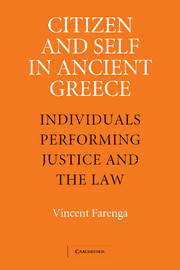19 results
A BIOGRAPHY OF ALEXANDER - T.R. Martin, C.W. Blackwell Alexander the Great. The Story of an Ancient Life. Pp. xiv + 193, maps. Cambridge: Cambridge University Press, 2012. Paper, £15.99, US$24.99 (Cased, £45, US$75). ISBN: 978-0-521-14844-3 (978-0-521-76748-4 hbk).
-
- Journal:
- The Classical Review / Volume 65 / Issue 1 / April 2015
- Published online by Cambridge University Press:
- 26 November 2014, pp. 177-179
- Print publication:
- April 2015
-
- Article
- Export citation
AN ALEXANDER READER - I. Worthington (ed.) Alexander the Great. A Reader. Second edition. Pp. xxviii + 420, maps. London and New York: Routledge, 2012 (first edition 2003). Paper, £28.99, US$48.95 (Cased, £90, US$145). ISBN: 978-0-415-66743-2 (978-0-415-66742-5 hbk).
-
- Journal:
- The Classical Review / Volume 65 / Issue 1 / April 2015
- Published online by Cambridge University Press:
- 21 October 2014, pp. 179-181
- Print publication:
- April 2015
-
- Article
- Export citation
Notes on contributors
-
-
- Book:
- Probabilities, Hypotheticals, and Counterfactuals in Ancient Greek Thought
- Published online:
- 05 September 2014
- Print publication:
- 11 September 2014, pp viii-x
-
- Chapter
- Export citation
Chapter 5 - Open and speak your mind
-
-
- Book:
- Probabilities, Hypotheticals, and Counterfactuals in Ancient Greek Thought
- Published online:
- 05 September 2014
- Print publication:
- 11 September 2014, pp 84-100
-
- Chapter
- Export citation
7 - Democracy's Narcissistic Citizens: Alcibiades and Socrates
-
- Book:
- Citizen and Self in Ancient Greece
- Published online:
- 23 July 2009
- Print publication:
- 29 May 2006, pp 471-535
-
- Chapter
- Export citation
2 - Performing Justice in Early Greece: Dispute Settlement in the Iliad
-
- Book:
- Citizen and Self in Ancient Greece
- Published online:
- 23 July 2009
- Print publication:
- 29 May 2006, pp 109-173
-
- Chapter
- Export citation
References
-
- Book:
- Citizen and Self in Ancient Greece
- Published online:
- 23 July 2009
- Print publication:
- 29 May 2006, pp 549-576
-
- Chapter
- Export citation
4 - Performing the Law: The Lawgiver, Statute Law, and the Jury Trial
-
- Book:
- Citizen and Self in Ancient Greece
- Published online:
- 23 July 2009
- Print publication:
- 29 May 2006, pp 262-345
-
- Chapter
- Export citation
3 - Self-Transformation and the Therapy of Justice in the Odyssey
-
- Book:
- Citizen and Self in Ancient Greece
- Published online:
- 23 July 2009
- Print publication:
- 29 May 2006, pp 174-261
-
- Chapter
- Export citation
Contents
-
- Book:
- Citizen and Self in Ancient Greece
- Published online:
- 23 July 2009
- Print publication:
- 29 May 2006, pp vii-viii
-
- Chapter
- Export citation
Acknowledgments
-
- Book:
- Citizen and Self in Ancient Greece
- Published online:
- 23 July 2009
- Print publication:
- 29 May 2006, pp ix-x
-
- Chapter
- Export citation
Conclusion
-
- Book:
- Citizen and Self in Ancient Greece
- Published online:
- 23 July 2009
- Print publication:
- 29 May 2006, pp 536-548
-
- Chapter
- Export citation
6 - The Naturalization of Citizen and Self in Democratic Athens, 450–411
-
- Book:
- Citizen and Self in Ancient Greece
- Published online:
- 23 July 2009
- Print publication:
- 29 May 2006, pp 424-470
-
- Chapter
- Export citation
Frontmatter
-
- Book:
- Citizen and Self in Ancient Greece
- Published online:
- 23 July 2009
- Print publication:
- 29 May 2006, pp i-vi
-
- Chapter
- Export citation
5 - Citizenship by Degrees: Ephebes and Demagogues in Democratic Athens, 465–460
-
- Book:
- Citizen and Self in Ancient Greece
- Published online:
- 23 July 2009
- Print publication:
- 29 May 2006, pp 346-423
-
- Chapter
- Export citation

Citizen and Self in Ancient Greece
- Individuals Performing Justice and the Law
-
- Published online:
- 23 July 2009
- Print publication:
- 29 May 2006
Index
-
- Book:
- Citizen and Self in Ancient Greece
- Published online:
- 23 July 2009
- Print publication:
- 29 May 2006, pp 577-592
-
- Chapter
- Export citation
Introduction
-
- Book:
- Citizen and Self in Ancient Greece
- Published online:
- 23 July 2009
- Print publication:
- 29 May 2006, pp 1-36
-
- Chapter
- Export citation
1 - Justice to the Dead: Prototypes of the Citizen and Self in Early Greece
-
- Book:
- Citizen and Self in Ancient Greece
- Published online:
- 23 July 2009
- Print publication:
- 29 May 2006, pp 37-108
-
- Chapter
- Export citation



